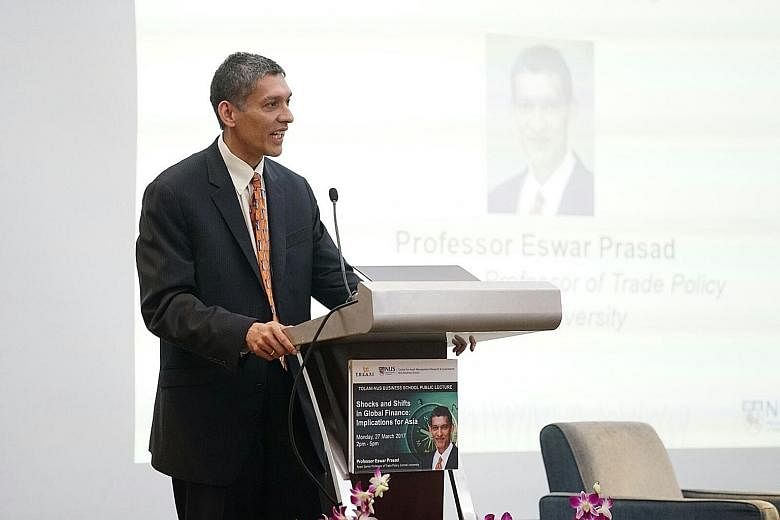China could gradually take over the leadership role in shaping the international economic order if the United States continues its withdrawal from the global stage.
The power shift is part of the uncertain future envisioned by renowned academic Eswar Prasad, who thinks peripheral countries will have little choice in the process.
"In the long term, China is going to expand its influence in the region and beyond, and it's going to be a period - could be five years, could be 10 - of very substantial rejigging of international trade and financial systems in a way that's more to China's liking, especially if the US continues down the path of not providing leadership and disengaging," he said.
Professor Prasad, who is from Cornell University in the United States and a senior fellow at the Brookings Institution, was in town for a public lecture yesterday at the Pan Pacific Singapore hotel.
He noted that regional countries will likely accept China's rise to the top "not quite as friends, not quite with trust, but more with a sense of inevitability", adding "there's very little option than to align more closely to China".
The transition may look peaceful on the surface, but there is bound to be tension underneath that may emerge any time, warned Prof Prasad.
His observations echoed the widely held perception that the "America first" policy approach adopted by the Trump administration is weakening the superpower's standing and influence in the world.
One of Mr Donald Trump's first executive orders was to pull the US out of the Trans-Pacific Partnership. He is also said to be planning to cut funding aid to the United Nations.
Meanwhile, China is showing an increasing level of deftness in cultivating its global influence, noted Prof Prasad at the NUS Business School event.
Whereas in the past China would often "throw money" in emerging economies to shore up influence, it has gradually learnt to play a much more active role in existing international institutions or set up new ones, "so that it can write the rules of the game for international economy on its own terms".
China is the leader of the Asian Infrastructure Investment Bank, a recently created institution seen as a rival to the World Bank.
The One Belt One Road initiative is also widely touted by many Asian economies as a game changer in regional trade and investment.
But despite these changing dynamics, the power of the greenback is still definitive in the global financial market.
The Chinese yuan "has little chance" to become the go-to safe haven currency like the US dollar, because China does not yet command international trust in its political and legal systems.
Reforms in these areas are "off the table" for the Chinese government as it prioritises stability, Prof Prasad noted.


